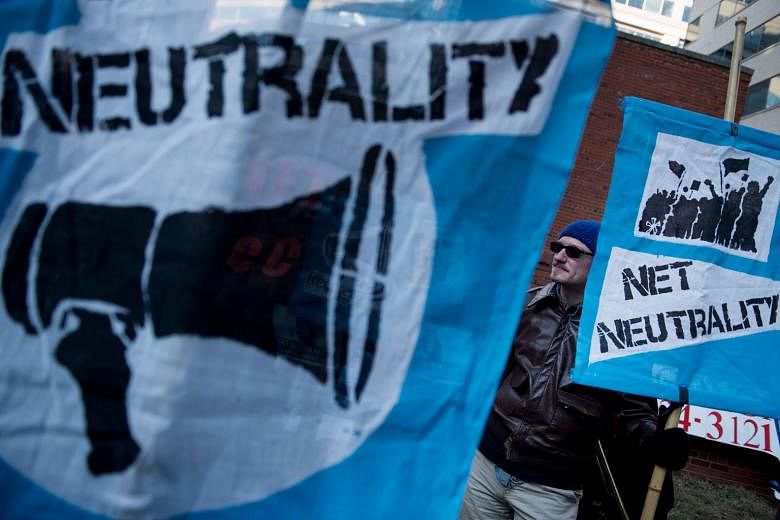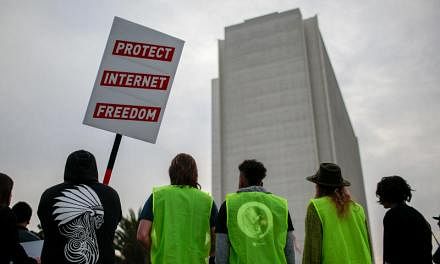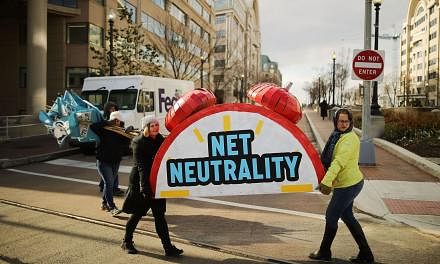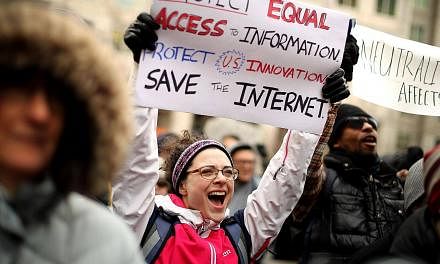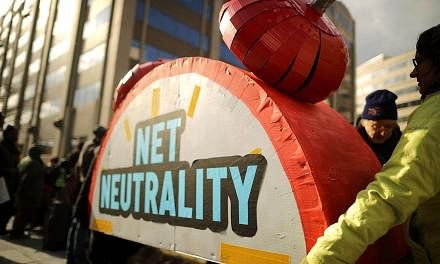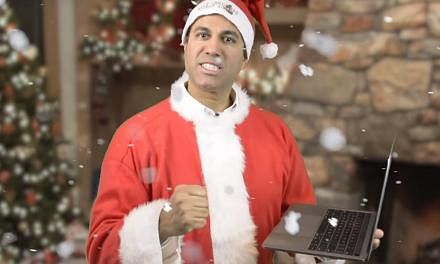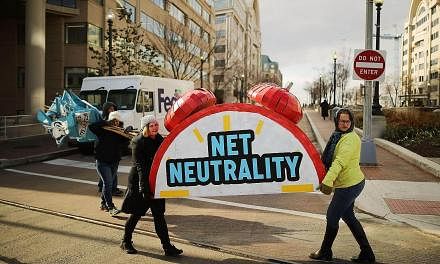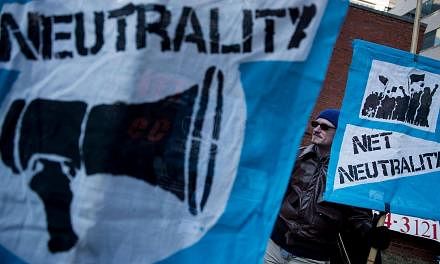WASHINGTON • The Federal Communications Commission (FCC) voted along party lines on Thursday (Dec 14) to repeal landmark 2015 rules aimed at ensuring a free and open Internet, in a victory for US Internet service providers (ISPs).
Critics, however, contend that the plan could kill the open Internet as we know it.
Here are some questions and answers about the so-called "Net neutrality" debate.
What is Net neutrality and why is it important?
The concept dates back to the early days of the Web, and requires ISPs to treat all data equally - prohibiting the blocking of sites or services for competitive reasons, and banning "fast" and "slow" lanes for different kinds of online traffic.
Backers of Net neutrality argue that the handful of high-speed US ISPs have incentives to block or degrade services that compete with their own offerings, in areas such as video streaming, calling or even Web search.
FCC rollback backers argue that neutrality rules crimp broadband firms and prevent investment in new high-speed services such as video conferencing, telemedicine and connected vehicles that would need "fast lanes".
Neutrality activists have staged street and online protests over the move backed by many major tech firms and Hollywood celebrities.
The large broadband firms meanwhile have invested heavily in lobbying.
How did the Net neutrality rules come about?
The original rules went into effect in 2015, during the Barack Obama administration, as part of a regulatory plan to address a rapidly changing Internet. Under those regulations, broadband service was considered a utility, much like phone services, giving the FCC broad power over ISPs.
FCC chairman Ajit Pai, who was appointed by President Donald Trump, has been a fierce critic of the rules. He says the repeal would restore a "light touch" regulatory approach that would promote innovation among service providers.
What happens next?
It will take weeks for the repeal to go into effect, so consumers will not see any of the potential changes right away.
It remains unclear how the big ISPs will respond. Their main trade group has pledged that the firms would refrain from blocking, throttling (slowing the transmission of data) or degrading any "lawful" content or application.
When it comes into effect, however, the move will likely be met with political and legal challenges from Net neutrality supporters.
Meanwhile, US broadband firms have said that nothing will change in how the Internet operates, but the move will allow them to have a freer hand to innovate and invest in new technologies.
Instead of simply blocking rivals, the ISPs may step up special offers for customers, such as free access to sports from mobile devices.
Some activists also fear that ISPs will seek to extract higher fees from services that are heavy data users, such as Netflix or other streaming services, with these costs passed on to consumers.
But the ones more likely to feel the pain would be new start-ups without the resources of Google or Facebook. They worry the move would lead to them having to pay to reach consumers.
What does this mean for the global Internet?
Many countries around the world look to the US to set standards, but each country has its own rules.
The US situation is unique because it relies on private carriers creating and investing in their own networks, while many other countries share network infrastructure from a current or former telecom monopoly. The new rules, backers say, are adapted for the US systems.
The European Union also has guidelines on Net neutrality, but each country implements its own rules.
In some countries, Internet bundling is already happening. In October, California Democratic Representative Ro Khanna posted a screenshot on Twitter from a Portuguese mobile carrier that showed subscription plans with names like Social, Messaging and Video. He wrote that providers were "starting to split the Net".
What is Singapore's policy?
Singapore's Infocomm Media Development Authority, which regulates Internet policy, said there are no plans to change its stance on Net neutrality made in 2011.
The country's current Net neutrality policy forbids ISPs from "blocking legitimate Internet content", according to a 2011 White Paper the authority put out.
ISPs also cannot implement practices that render content "effectively inaccessible or unusable".
So, while ISPs can still throttle Internet traffic, they cannot do so to the extent that users are practically unable to access websites or the Internet.
However, there is no definition of what constitutes "unusable" connectivity.
ISPs in Singapore are also allowed to offer specialised or customised plans to differentiate themselves from the competition.
This lets ISPs, including telcos, offer what is known as zero-rating plans, where certain services do not count towards, for instance, a monthly data cap.
SOURCE: Agence France-Presse, Reuters, NYTimes
• Additional reporting by Lester Hio
